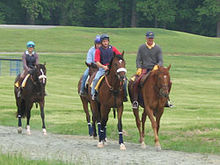The University of Pennsylvania’s School of Veterinary Medicine (Penn Vet) is pleased to announce that following an international search for a uniquely qualified candidate, Kurt D. Hankenson, DVM, MS, PhD has been appointed as the first incumbent of the Dean W. Richardson Professorship in Equine Disease Research.

Barbaro - Laminitis lead to death
With the appointment of Kurt D. Hankenson, DVM, MS, PhD, as the first incumbent of the Dean W. Richardson Professorship in Equine Disease Research, significant steps forward will be made in the study of laminitis and other equine musculoskeletal diseases.
The Dean W. Richardson Professorship was established by Mr. and Mrs. M. Roy Jackson, following the hospitalization of their Kentucky Derby winner, Barbaro, at Penn Vet’s New Bolton Center. Their desire to contribute to the treatment and elimination of laminitis was the catalyst for their gift to endow the professorship.
Mr. and Mrs. Jackson commented, “We are very pleased that this position has been filled and are confident that under Dr. Hankenson’s leadership significant steps forward will be made in the study of laminitis and other equine musculoskeletal diseases. We have faith in Penn Veterinary Medicine’s ability to do the kind of in-depth work that will bring about positive results.”
Dr. Hankenson did his undergraduate work at the University of Illinois, where he earned his BS in 1990, and then he earned his veterinary degree at University of Illinois’ College of Veterinary Medicine in 1992. Following his time as an equine clinician, he returned to academia and completed a Master of Science degree at Purdue University’s School of Veterinary Medicine in 1997. He received a Ph.D. from the Department of Biochemistry at the University of Washington’s School of Medicine in 2001.
Dr. Hankenson’s career has included an impressive range of clinical and academic positions at both human and veterinary health care institutions, and currently holds a faculty position at Penn Vet and at Penn’s Perelman School of Medicine.
“I’d like to thank Mr. and Mrs. Jackson for supporting the research mission of Penn Vet by providing this Professorship. I am thrilled to be entering a new phase of my research and teaching career at New Bolton Center, and to be expanding my research program to focus on equine musculoskeletal diseases, particularly laminitis,” said Dr. Hankenson.
“I will capitalize on my background as an equine practitioner and basic scientist, and will utilize established relationships with scientists and veterinarians in the Philadelphia region and around the world to develop new diagnostics and treatments to prevent disease, and to expedite regeneration and return to normal function.
The Richardson Chair is a unique and unparalleled opportunity for New Bolton Center, Penn Vet, and the equine industry. It will permit me to develop and sustain a research program focused on equine health.”
Surgeon Dr. Dean W. Richardson and his team cared for Barbaro for nine months, from May 2006 until January 2007. Dr. Richardson noted, “We are very excited to attract a scientist of this caliber to this position.
In today's research environment, it will be an enormous advantage to have someone like Dr. Hankenson, who has a proven record of both research funding and productivity. He has a wide range of connections both here at Penn and throughout the scientific community. Dr. Hankenson's roots are in the horse world and he is sure to make major contributions to equine research.”
Joan C. Hendricks, VMD, PhD, the Gilbert S. Kahn Dean of Veterinary Medicine, said that she is especially pleased at Dr. Hankenson’s appointment.
“This is another example of Penn Vet’s ability to attract and retain the very best and brightest in the field of veterinary medicine,” said Dean Hendricks. “I am thrilled that Dr. Hankenson will be leading this endeavor and am confident that under his leadership, Penn Vet will remain at the forefront of discovery for this debilitating disease.”
The goal of the Dean W. Richardson Professorship is the development of a world-leading research program directly applicable to equine diseases, with particular emphasis on improving the understanding, prevention, and treatment of equine laminitis. A debilitating, painful, and uncompromising condition, laminitis is the second leading killer of horses worldwide and is presently uncurable.
Winner of the 2006 Kentucky Derby and a beloved American icon, Barbaro suffered a catastrophic fracture during the running of the Preakness. After undergoing successful surgery at New Bolton Center, he developed severe laminitis that eventually led to his death. This Professorship serves as a lasting legacy of Barbaro.
About Penn Vet
Penn Vet is one of the world’s premier veterinary schools. Founded in 1884, the school was built on the concept of Many Species, One MedicineTM. The birthplace of veterinary specialties, the school serves a distinctly diverse array of animal patients at its two campuses, from companion animals to horses to farm animals.
The School has two campuses and is the only veterinary school in the Commonwealth of Pennsylvania. The large-animal facility, New Bolton Center, in Kennett Square, Pa., includes the George D. Widener Veterinary Hospital for large animals; diagnostic laboratories serving the agriculture industry; and research facilities to determine new treatment and diagnostic measures for large-animal diseases.
In Philadelphia, on Penn’s campus, are the Matthew J. Ryan Veterinary Hospital of the University of Pennsylvania (Ryan Hospital) for companion animals; classrooms; research laboratories; and the School’s administrative offices.
